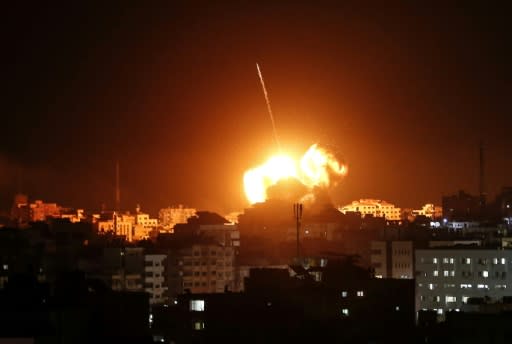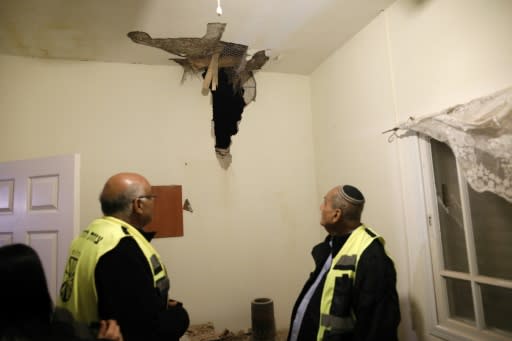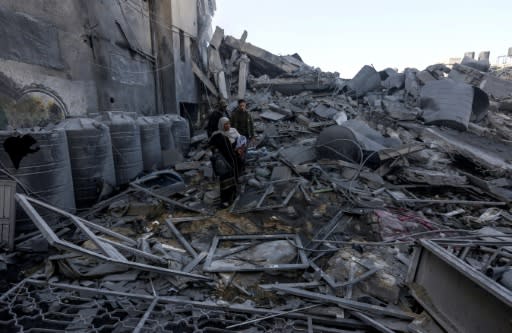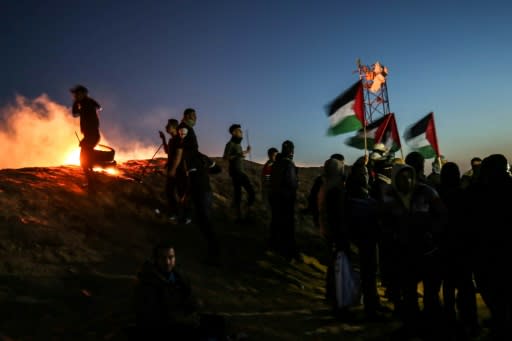Israel-Hamas flare-up: Where next?
Israel and Hamas appeared close to a new conflict for much of Monday, though the situation calmed with the announcement of a ceasefire by the Islamist group. Israel has not yet confirmed the deal and fears remain of more violence in the build-up to the country's general election in two weeks. What happened? Ar around 5:15 am (0315 GMT) on Monday, a rocket was fired from southern Gaza, crashing into a house north of the Israeli commercial capital Tel Aviv. Seven people, including three children, were injured, with the family home destroyed. At 120 kilometres (75 miles), it was believed to be the longest range missile strike from Gaza since a 2014 war between the Jewish state and Gaza?s Islamist rulers Hamas. Israel said it had evidence Hamas fired the rocket. A Hamas official denied it was deliberate and suggested it could have been a technical malfunction caused by a storm that hit the region. In response Israel struck dozens of Hamas targets in Gaza late Monday, including flattening the office of Hamas chief Ismail Haniya. Seven people were wounded. Militant groups in Gaza fired a series of rockets from the territory towards Israel. Late Monday, Hamas announced that Egypt had brokered a ceasefire but that has not been confirmed by Israel. There were new Israeli raids and rockets fired from Gaza overnight. Playing with fire? Israel and Hamas have fought three wars since 2008 and analysts say a fourth remains likely. Israel holds Hamas responsible for any fire from Gaza and only the Islamist group and its ally Islamic Jihad are believed to have such long-range rockets. It is the second time in a month long-range rockets have been fired from Gaza. Hamas also said the first two, which targeted Tel Aviv, were a mistake. "Hamas is not interested in escalation, this is why they spoke to the Egyptians immediately," Omar Shaaban, a political analyst in Gaza, said. Egypt is the traditional mediator between the two sides and has brokered previous truces. "Hamas thinks how Israel has reacted (so far) is enough, it is within the borders of the game." What will Netanyahu do? Currently neither side appears keen for a full-blown conflict, though Israeli Prime Minister Benjamin Netanyahu stressed early Tuesday all options were on the table. "Hamas needs to know that we will not hesitate to go in and take all necessary steps -- regardless of anything, any date, other than Israel?s security needs." Netanyahu returned from the United States on Tuesday after achieving a major victory as President Donald Trump recognised Israel's control over the Golan Heights, which it seized from Syria in the Six-Day War of 1967. The steps he takes in the coming hours are likely to determine if the situation escalates or not. Jonathan Rynhold, a politics professor from Israel's Begin-Sadat Center for Strategic Studies, told AFP Netanyahu had a tough balancing act to keep his right-wing base happy while avoiding a war. "I think people prefer a stronger lesson but without the consequences of a stronger lesson, which means it's impossible for him basically." Election impact? Netanyahu, who leads what is seen as the most right-wing government in Israel's history, faces a major challenge from former army chief Benny Gantz in the April 9 election. He will be wary of losing votes by being seen as soft, but also knows a swift victory is near impossible. "The issue is that as it stands he might now lose a little bit of support if he doesn't respond more strongly," Rynhold said. But Netanyahu could also suffer politically if "he were to really ratchet it up into a conflict where Israelis had to go into the bomb shelters". "The more it drags on the more Netanyahu exposes himself to political attacks from election rivals over his handling of the situation," Hugh Lovatt, Israel-Palestine analyst at the European Council on Foreign Relations, said. "Given he is running on his security credentials that could be damaging to him in the polls, and push him into a stronger reaction." Hamas, too, is walking a tightrope, Shaaban said. Israel has maintained a crippling blockade on Gaza for more than a decade and Hamas has tried to use months of protests along the border to force Netanyahu into concessions. In November, Israel agreed to allow millions in Qatari aid into Gaza in exchange for relative calm. Protests have again grown in recent weeks. More than 200 Palestinians have been killed by Israeli fire during the often violent protests. One Israeli soldier has died during the protests and clashes. "Hamas don't want to go to war but they want to put pressure on Netanyahu to get as much as they can," Shaaban said. Saturday is the first anniversary of the protests and thousands are again expected to gather along the border, with fears it could trigger yet another escalation. After a night of violence in and around the Gaza Strip, there are fears of a slide into more serious conflict in the runup to an April 9 Israeli general election Volunteer rescuers stare at the damage in the ceiling of a house in the southern Israeli town of Sderot, caused by a rocket fired from the Gaza Strip Palestinians walk next to the rubble of a building in Gaza after Israeli air strikes hit dozens of sites overnight in response to rocket fire from the Palestinian enclave Israeli Prime Minister Benjamin Netanyahu faces a tough challenge from centrist former army chief Benny Gantz in the April 9 election Regular protests along the Gaza-Israel border that have drawan a deadly response from the Israeli army have grown again ahead of their first anniversary on Saturday






